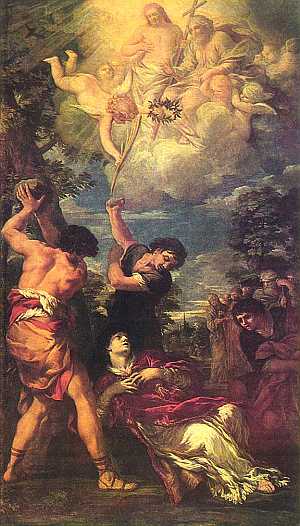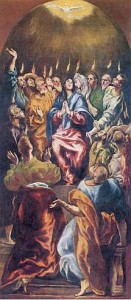I have a nagging question that will not go away:
How is it that so many Christians in the West willingly endorse the idea that the Gospel of Grace lay fallow for 1,000 years until “rediscovered” by the Reformation generation (Hus, Luther, Calvin), yet they find it incomprehensible that any other major component of God’s word might lie fallow longer and only find its rediscovery in our generation?
Yet that is what many Christians believe. It is as if the worldwide Church ceased to exist from 500-1500 A.D., flowered in the revelation of the Reformation, but has been on a deaf, downhill slide since. That belief also renders it impossible that our generation may experience any kind of renaissance in Christian spirituality.
I believe that this belief is the primary reason why so many people reject the charismata, not any Scriptural injunction, but an idea that, in essence, “it’ll never be better than Luther’s day.” Therefore, God will never choose to revitalize part of the True Faith during our day.
That’s too bad. It’s awfully presumptive as well.
Lakeland was a huge blow to the charismatic movement. And in a way, I thank God for it. Because it’s time for the foolishness to stop.
But it’s a logical fallacy to conclude that a charismatic reading of the Scriptures is wrong because some unhinged people claim to be charismatics. If one wanted to prove guilt by blanket condemnation, one would have to argue that the Holy Bible is not to be trusted because of the existence of The Book of Mormon or the New World Translation or any of the so-called “mystery books” or apocryphal writings that were supposedly “left out” of the Bible. And who now reading this believes that position?
It bothers me that so few people are able to look at catastrophes and meltdowns and glean anything from them other than polarizing positions. There never seems to be any middle ground, therefore the autopsy of the event thrusts people into starkly held positions. Positions which, when you get right down to it, end up not being the truth at all because prejudices get in the way of objective analysis.
But plenty of people want to dance on the grave of the charismatic movement. Me, I say, “Let ’em.” Why? Because I don’t acknowledge that what is commonly called “The Charismatic Movement” by outsiders and critics defines the genuine expression of the Holy Spirit operating through charismata in the True Church today. That label is far too broad, so it winds up encompassing both legitimate and illegitimate expressions of the charismata. Critics then look at the invalid expressions and label the entirety corrupt.
No better example of this exists than Pentecostal and charismatic TV ministries. And here’s the rub: I suspect that they dominate the airwaves and present a much broader, polarizing picture of what is deemed charismatic than really exists. What gets put on the airwaves is the flash, the dog and pony shows, that represent the worst, not the best, of what is deemed charismatic or Pentecostal.
If aliens from beyond our galaxy were able to intercept television signals from Earth, yet the only show they could receive was Teletubbies, what kind of whacked-out interpretation of life here would they form? So it is with charismania on TV. It may make for a wild show, but it’s not reality.
You want to know what is the genuine reality for charismatic and Pentecostal churches today?
Whenever we talk about the persecuted church in the world, those churches most oppressed by dictatorial regimes, those churches are, in many cases, Pentecostal.  The Chinese underground Church so revered here by high-minded Western Christians? Mostly Pentecostal or with a belief that the charismata exist today. In fact, if one were to look around the globe, the revivals we see in developing countries, the thousands coming to Christ in the “backwaters” of the globe, those new Christians are Pentecostals/charismatics. For the far greater part, they are NOT Presbyterians, Nazarenes, Methodists, Lutherans, Reformed, Brethren, Episcopalian, or any other denomination of that type.
The Chinese underground Church so revered here by high-minded Western Christians? Mostly Pentecostal or with a belief that the charismata exist today. In fact, if one were to look around the globe, the revivals we see in developing countries, the thousands coming to Christ in the “backwaters” of the globe, those new Christians are Pentecostals/charismatics. For the far greater part, they are NOT Presbyterians, Nazarenes, Methodists, Lutherans, Reformed, Brethren, Episcopalian, or any other denomination of that type.
This is not some kind of slam on those other denominations. It’s just an acknowledgment that it is easy to bash Pentecostals and charismatics with blanket statements that end up making all us Western Christians look foolish.
What is the common denominator between the televised dog and pony shows fronted by red-faced, Armani-wearing Branham devotees and the persecuted Chinese Church? Not a whole lot. At all. Yet far too many people want to mash them up and label them the same thing.
There’s a word for that: lazy.
So if anyone out there wants to dance on the grave of what was epitomized by Lakeland, be my guest. But be exceptionally careful where else you jig because you may very well be contributing to the persecution of genuine, faithful, humble Christians who just so happen to believe the gifts of the Holy Spirit are still for today.
 With passion week arriving soon, we will begin to experience the high holy days of the Christian Church. We will also experience the dividing lines along which most Christian churches fall.
With passion week arriving soon, we will begin to experience the high holy days of the Christian Church. We will also experience the dividing lines along which most Christian churches fall.

 The Chinese underground Church so revered here by high-minded Western Christians? Mostly Pentecostal or with a belief that the charismata exist today. In fact, if one were to look around the globe, the revivals we see in developing countries, the thousands coming to Christ in the “backwaters” of the globe, those new Christians are Pentecostals/charismatics. For the far greater part, they are NOT Presbyterians, Nazarenes, Methodists, Lutherans, Reformed, Brethren, Episcopalian, or any other denomination of that type.
The Chinese underground Church so revered here by high-minded Western Christians? Mostly Pentecostal or with a belief that the charismata exist today. In fact, if one were to look around the globe, the revivals we see in developing countries, the thousands coming to Christ in the “backwaters” of the globe, those new Christians are Pentecostals/charismatics. For the far greater part, they are NOT Presbyterians, Nazarenes, Methodists, Lutherans, Reformed, Brethren, Episcopalian, or any other denomination of that type.